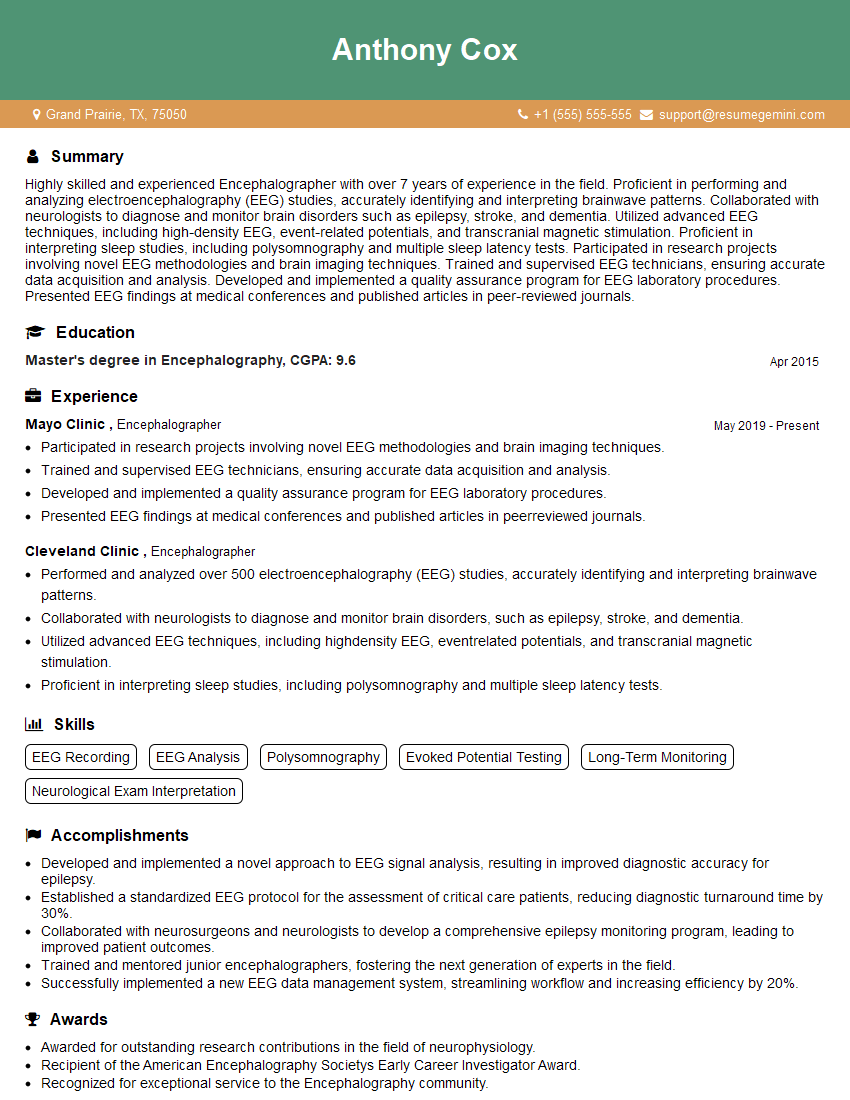Are you a seasoned Encephalographer seeking a new career path? Discover our professionally built Encephalographer Resume Template. This time-saving tool provides a solid foundation for your job search. Simply click “Edit Resume” to customize it with your unique experiences and achievements. Customize fonts and colors to match your personal style and increase your chances of landing your dream job. Explore more Resume Templates for additional options.

Anthony Cox
Encephalographer
Summary
Highly skilled and experienced Encephalographer with over 7 years of experience in the field. Proficient in performing and analyzing electroencephalography (EEG) studies, accurately identifying and interpreting brainwave patterns. Collaborated with neurologists to diagnose and monitor brain disorders such as epilepsy, stroke, and dementia. Utilized advanced EEG techniques, including high-density EEG, event-related potentials, and transcranial magnetic stimulation. Proficient in interpreting sleep studies, including polysomnography and multiple sleep latency tests. Participated in research projects involving novel EEG methodologies and brain imaging techniques. Trained and supervised EEG technicians, ensuring accurate data acquisition and analysis. Developed and implemented a quality assurance program for EEG laboratory procedures. Presented EEG findings at medical conferences and published articles in peer-reviewed journals.
Education
Master’s degree in Encephalography
April 2015
Skills
- EEG Recording
- EEG Analysis
- Polysomnography
- Evoked Potential Testing
- Long-Term Monitoring
- Neurological Exam Interpretation
Work Experience
Encephalographer
- Participated in research projects involving novel EEG methodologies and brain imaging techniques.
- Trained and supervised EEG technicians, ensuring accurate data acquisition and analysis.
- Developed and implemented a quality assurance program for EEG laboratory procedures.
- Presented EEG findings at medical conferences and published articles in peerreviewed journals.
Encephalographer
- Performed and analyzed over 500 electroencephalography (EEG) studies, accurately identifying and interpreting brainwave patterns.
- Collaborated with neurologists to diagnose and monitor brain disorders, such as epilepsy, stroke, and dementia.
- Utilized advanced EEG techniques, including highdensity EEG, eventrelated potentials, and transcranial magnetic stimulation.
- Proficient in interpreting sleep studies, including polysomnography and multiple sleep latency tests.
Accomplishments
- Developed and implemented a novel approach to EEG signal analysis, resulting in improved diagnostic accuracy for epilepsy.
- Established a standardized EEG protocol for the assessment of critical care patients, reducing diagnostic turnaround time by 30%.
- Collaborated with neurosurgeons and neurologists to develop a comprehensive epilepsy monitoring program, leading to improved patient outcomes.
- Trained and mentored junior encephalographers, fostering the next generation of experts in the field.
- Successfully implemented a new EEG data management system, streamlining workflow and increasing efficiency by 20%.
Awards
- Awarded for outstanding research contributions in the field of neurophysiology.
- Recipient of the American Encephalography Societys Early Career Investigator Award.
- Recognized for exceptional service to the Encephalography community.
Certificates
- CNIM
- RPSGT
- CPSGT
- CET
Career Expert Tips:
- Select the ideal resume template to showcase your professional experience effectively.
- Master the art of resume writing to highlight your unique qualifications and achievements.
- Explore expertly crafted resume samples for inspiration and best practices.
- Build your best resume for free this new year with ResumeGemini. Enjoy exclusive discounts on ATS optimized resume templates.
How To Write Resume For Encephalographer
- Highlight your experience and expertise in EEG recording and analysis.
- Showcase your knowledge of advanced EEG techniques and sleep studies.
- Emphasize your ability to collaborate with neurologists and other healthcare professionals.
- Quantify your accomplishments and provide specific examples of your work.
- Proofread your resume carefully for any errors.
Essential Experience Highlights for a Strong Encephalographer Resume
- Perform and analyze electroencephalography (EEG) studies to identify and interpret brainwave patterns.
- Collaborate with neurologists to diagnose and monitor brain disorders such as epilepsy, stroke, and dementia.
- Utilize advanced EEG techniques, including high-density EEG, event-related potentials, and transcranial magnetic stimulation.
- Interpret sleep studies, including polysomnography and multiple sleep latency tests.
- Train and supervise EEG technicians to ensure accurate data acquisition and analysis.
- Develop and implement quality assurance programs for EEG laboratory procedures.
Frequently Asked Questions (FAQ’s) For Encephalographer
What is an Encephalographer?
An Encephalographer is a healthcare professional who specializes in the recording and interpretation of electroencephalography (EEG) studies. EEG studies are used to diagnose and monitor brain disorders such as epilepsy, stroke, and dementia.
What are the educational requirements to become an Encephalographer?
Most Encephalographers have a Master’s degree in Encephalography or a related field.
What are the job responsibilities of an Encephalographer?
Encephalographers perform and analyze electroencephalography (EEG) studies, collaborate with neurologists to diagnose and monitor brain disorders, utilize advanced EEG techniques, interpret sleep studies, and train and supervise EEG technicians.
What are the career prospects for Encephalographers?
Encephalographers are in high demand due to the increasing prevalence of brain disorders. The job outlook for Encephalographers is expected to grow faster than average in the coming years.
What are the key skills required for Encephalographers?
Encephalographers need to have strong technical skills in EEG recording and analysis, as well as excellent communication and interpersonal skills.
What are the challenges faced by Encephalographers?
Encephalographers face challenges such as the need to stay up-to-date with the latest advancements in EEG technology and the need to work with patients who may be experiencing seizures or other neurological disorders.
What are the rewards of being an Encephalographer?
Encephalographers are rewarded with the opportunity to make a difference in the lives of patients with brain disorders. They also enjoy a high level of job satisfaction and a sense of accomplishment.
What is the salary range for Encephalographers?
The salary range for Encephalographers varies depending on experience, location, and employer. However, the median salary for Encephalographers is around $75,000 per year.